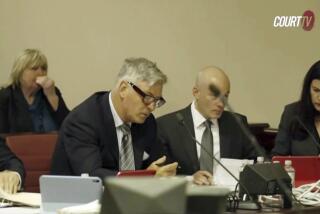George Zimmerman trial: Jury selection grinds into second day
The second day of jury selection in the George Zimmerman murder trial inched along on Tuesday as lawyers tried to uncover the politics and leanings of prospective jurors.
Zimmerman, 29, is charged with second-degree murder in the shooting of unarmed African American teenager Trayvon Martin. Zimmerman has apologized for shooting Martin, 17, in a confrontation on Feb. 26, 2012, in Sanford, Fla., but insists he acted in self-defense. The case sparked local and national demonstrations accusing Zimmerman, a former neighborhood watch volunteer, of having profiled Martin because the teenager was black.
During the Tuesday morning session at the Seminole County courthouse in Sanford, the lawyers interviewed four prospective jurors from the more than 100 who have filled out questionnaires. After each set of questions, the lawyers met with Judge Debra S. Nelson where they discussed which of the possible jurors would be excused. Four possible jurors were questioned on Monday.
PHOTOS: The controversial case in pictures
The sides are trying to form a pool of 21 possible jurors who will go through the traditional voir dire to determine their views in depth. Eventually, a panel of six jurors will decide Zimmerman’s fate. Four alternate jurors also will be selected and all of the names will be kept from the public to protect the jurors’ privacy.
Though the initial round of questioning has mainly dealt with the effect of pre-trial publicity, it has inevitably led to some insights into the thinking of the jurors.
For example, Juror “B35,” a middle-aged black man who said he owns vending machines, described last year’s protests over the shooting as saber-rattling and wondered why there hadn’t been demonstrations when other black men had been fatally shot.
WHO’S WHO: Key players in the Zimmerman trial
“I think they politicized it and made it a racial issue, and I didn’t like that,” the possible juror said. “I wasn’t agreeing with the racial connotation.”
The other thread in the trial is self-defense. Florida has a “stand your ground” law, which allows the legal use of force in more circumstances than in many other states. Zimmerman has waived his right to a special hearing under the law, but the self-defense claim is the heart of the defense, though it is unclear exactly how the law might be used.
One possible juror, B7, a middle-aged white man, said he didn’t think Florida’s “stand your ground” law was necessary given other self-defense laws that were in place. The juror also questioned the extensive media coverage of the case.
FULL COVERAGE: The Trayvon Martin case
“I didn’t like the way the news covered it.... It felt very speculative,” he said, adding he thought a lot of people “have taken sides on it ... I find that inappropriate.”
The third potential juror was a middle-aged woman who said she had lots of pets, including three dogs, four cats, a couple of lizards and one parrot. She said she liked to watch NBC, but wasn’t too keen on newspapers.
“The newspapers are used in the parrot’s cage, not even read,” she said, adding that she doesn’t think they’re truthful.
“You never get all the information,” she said, “without it being skewed one way or the other.”
However, the next prospective juror defended the local media, especially newspapers.
“I’m probably one of the few, but I do get the paper,” said the elderly woman, identified as B51.
“My assumption is that they cover what happened,” she said later.
ALSO:
Jury chosen for trial of reputed Boston mobster Whitey Bulger
Three years later, BP oil cleanup ends in some Gulf Coast states
Philadelphia building collapse survivor: ‘I started running for my life’
More to Read
Sign up for Essential California
The most important California stories and recommendations in your inbox every morning.
You may occasionally receive promotional content from the Los Angeles Times.












